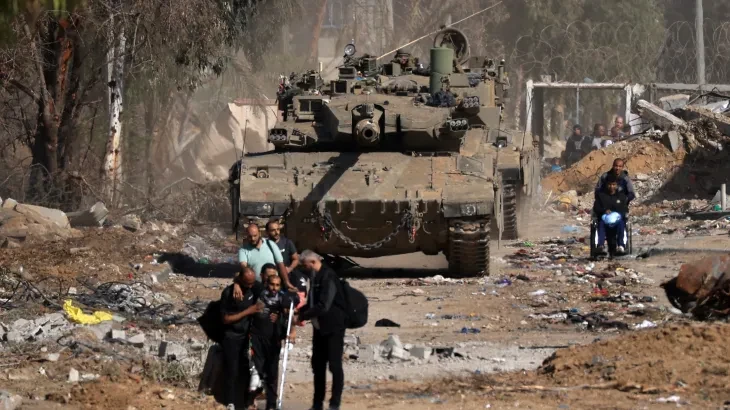Why is Israel intensifying operations in north Gaza?

Stay tuned with 24 News HD Android App

The Israeli military has once again stepped up its air and ground operations in Gaza's ravaged north, with troops even encircling the key city of Jabaliya and some surrounding areas.
The stated goal is to destroy the operational capabilities Hamas is trying to rebuild there, and for that the military has ordered residents to evacuate the area.
AFP spoke to analysts who said the military aims to impose a total siege on Jabaliya until Hamas fighters surrender.
What is the army doing in north Gaza?
The army has surrounded the northern city of Jabaliya since Sunday, as well as other nearby neighbourhoods.
The army said its 162nd Division began conducting operations, reporting close-quarter combat and weapons seizures.
Gaza's civil defence agency said the area has been pounded with air strikes in recent days, with dozens killed.
The military said it has killed at least "20 terrorists".
Hamas has said its fighters are targeting Israeli soldiers and tanks.
On Monday, Israeli army spokesman Avichay Adraee issued a warning on social media, urging residents of the northern towns of Beit Hanoun, Jabaliya, Beit Lahia and other neighbourhoods to evacuate to southern Gaza.
Israeli forces "are currently operating intensively in the area", Adraee wrote in Arabic.
On Tuesday, Gaza's health ministry issued an appeal to the international community to bring in fuel lest all hospitals "stop providing services due to the lack of fuel".
While some civilians have fled the north since the start of the operation, many have chosen to stay for want of safe alternatives, said Tariq Dana, a specialist in Palestinian politics at the Doha Institute for Graduate Studies.
"Despite the widespread destruction of infrastructure and severe shortages of food, water, medicine and fuel, hundreds of thousands remained despite many forced to move southward," Dana said.
What's the Israeli plan?
Though he said no one would be forced to move in Gaza, Reserve Brigadier General Amir Avivi, founder of the Israel Defense and Security Forum think tank, suggested those who remained would face great danger.
"If citizens choose to stay in the middle of a war zone, it's dangerous," he told AFP.
In the long term, though, he said "I'm not sure it's realistic to have full control."
A plan for Gaza penned by retired Major General Giora Eiland suggests the evacuation of civilians could be followed by an intensified siege where nothing would enter the area until fighters surrender.
Though the plan is not official army policy, analysts suggested that the idea of a full siege of the north of Gaza is gaining traction.
"I think that what we'll see in areas (from) where really the citizens were evacuated to the south (that).. the IDF (military) will be able to put a siege on the area," Avivi said.
The siege would include "making sure that there is no humanitarian aid going to this area", to force fighters into surrender, he added.
Dana fears that the evacuations could give way to permanent displacement and loss of territory for the Gaza Strip.
"It seems Israel aims to create long-term demographic changes through displacement to fully colonise Gaza," he said.
Ofer Shelah, a programme director at Israel's Institute for National Security Studies, said that from the Israeli standpoint there are two choices for post-war Gaza.
"Either we move with a coalition, a Middle East coalition backed by the United States.. or we deteriorate.. into a situation where Israel is in control of northern Gaza and probably all of the Gaza Strip" he told AFP.
What is left of Hamas in the north?
Though the Israeli army previously operated in the north of the Gaza Strip, its main focus in recent months had been the south of the territory.
This allowed Hamas to rebuild its military capabilities in the north, which the army says it is now targeting.
"Now we have to go back because Hamas is getting stronger there, but it's like, you know, emptying a barrel that's open on the other end," Shelah said.
Avivi said Hamas units had been reduced to small isolated bands in the north.
"They are operating really very locally, you know, with small groups of three, four terrorists, maybe eight at the most, in a way that is not very coordinated," he told AFP.
"Their capabilities are degrading all the time," he added, pointing to rocket launches from Gaza on Monday, which he said were small in comparison to those of a year ago.
